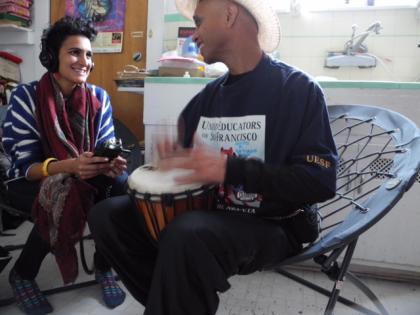In early October 2012, I did my first interview for Brooklyn Historical Society’s Crossing Borders Bridging Generations oral history project. Vilray Bolles and I sat around my kitchen table and had a wide-ranging conversation about his family history, identity, and life. I grew up with Vilray in Park Slope, Brooklyn, often spending time together in the very apartment in which we did the interview. I know his whole family, his brothers and parents, and he knows my entire family. But as we sat face to face talking, I realized how long one can know someone without ever knowing certain intimacies about them or having certain conversations with them. I realized that Vilray and I, though we both come from families of mixed-heritage, in which one of our parents immigrated to the country and the other was born here, in which one parent identified as white, the other not, had never explicitly talked about our mixed-heritage or issues of race together.
Through the interview, a rare and important space was opened up for us to talk about something that had affected us both, albeit in different ways. As I continued to conduct interviews for the Crossing Borders, Bridging Generations project, I realized that this was a common theme; whether interviewing people who I knew well—my brother, cousin, close friends—or others with whom I had no prior relation: that making the space to talk about being of mixed-heritage, to have long contemplative, intimate conversations about heritage, race, racism, identity and family history, was unique and not often done.
Over the past year and a half of collecting interviews, I have had the opportunity to have intensely personal conversations with people who identify as mixed-heritage, who are in mixed race or heritage relationships or who have mixed families. I’ve come to cherish the space of these interviews and what happens when people narrate their life history in relation to themes of race, heritage and identity. In listening to these stories, in seeking to listen deeply, to reflect and engage with them, I realize that I too have learned and changed.
One of the most salient things I have learned is that the space to have such conversations is rare and indeed only exists when we intentionally make it. Race, ethnicity and identity are often the undercurrents in our interactions, interwoven into the fabric of our everyday lives, but most often they are not explicitly spoken about.


